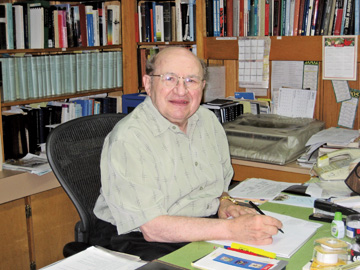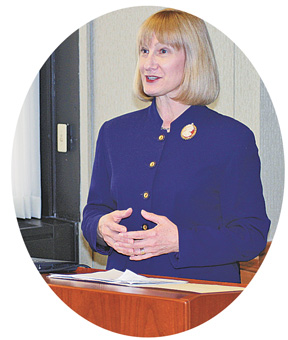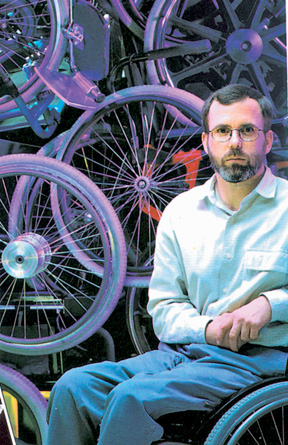Awards & More
Pitt communication professor Ronald J. Zboray and Mary S. Zboray, a visiting scholar in communication here, have received the Association for Education in Journalism and Mass Communication’s (AEJMC) award for Best Journalism and Mass Communication History Book of 2006.
The award-winning book, Everyday Ideas: Socioliterary Experience Among Antebellum New Englanders (University of Tennessee Press), spans the late 1820s to the beginning of the Civil War; its central theme is the impact literature had in molding the American Renaissance.
To write Everyday Ideas, the Zborays gathered information from more than 4,000 manuscript letters and diaries of factory workers, farmers, clerks, storekeepers, domestics, and teachers. The book addresses a wide range of issues, from political campaigns and religious controversies to the personal challenges of maintaining ties with separated loved ones.
“The results of this vast archival work is a rich picture of what New Englanders were thinking and how they were acting,” wrote Ray B. Browne in the March 2007 edition of the Journal of American Culture. “The book is rich in the detail of everybody’s everyday life in New England, and as such those of our ancestors. It is a rich thesaurus indeed and should be owned, read, and treasured by everyone.”
The annual award was presented to the Zborays during the AEJMC conference Aug. 9-12 in Washington, D.C. The AEJMC is an international nonprofit, educational association made up of more than 3,500 journalism and mass communication faculty, administrators, students, and media professionals.

Adolf Grünbaum
Pitt professor Adolf Grünbaum, president of the International Union of History and Philosophy of Science (IUHPS), delivered his presidential address during the IUHPS’ quadrennial world congress in Beijing early this month. IUHPS is the worldwide umbrella organization of various national associations of philosophy of science as well as national societies of the history of science and technology.
Next month, Grünbaum will present an invited plenary paper in Prague during an international congress titled “Rethinking Karl Popper.” Also next month, Grünbaum is scheduled to be interviewed in Cologne (where he was born) by German radio and TV personality Arnd Henze.
Grünbaum is Pitt’s Andrew Mellon Professor of Philosophy of Science, primary research professor of history and philosophy of science, research professor of psychiatry, and chair of the Center for Philosophy of Science.
Isaum Sando, professor emeritus in the Pitt School of Medicine’s otolaryngology department, was awarded The Order of the Sacred Treasures medal, including Gold Ray with Neck Ribbon, for his long and meritorious services both to Japanese and non-Japanese people. Sando received the decoration May 11 in Tokyo. The award ceremony was followed by a visit to the Imperial Palace, where Sando was greeted by the Emperor and Empress of Japan.

Katherine L. Wisner
Katherine L. Wisner, a Pitt professor of psychiatry and director of Women’s Behavioral HealthCARE at the Western Psychiatric Institute and Clinic, received a Service Award from the Pennsylvania Perinatal Partnership during the Pennsylvania Leadership Summit on Depression During and After Pregnancy, held in Harrisburg in June. The award was given “in recognition of outstanding contributions to pioneering research and service delivery on the prevention, diagnosis and treatment of perinatal depression.”
Wisner is the principal investigator of the first large-scale National Institute of Mental Health-funded trial of methods to identify and treat postpartum depression.
Kathy S. Magdic, coordinator of the acute care nurse practitioner program and an instructor in the Pitt School of Nursing’s Department of Acute and Tertiary Care, was inducted as a Fellow of the American Academy of Nurse Practitioners (FAANP) last month during the academy’s national conference in Indianapolis.
Judith Klein-Seetharaman, an assistant professor of structural biology in the Pitt School of Medicine, has been named the winner of the 2007 Margaret Oakley Dayhoff Award by the Biophysical Society. The award, which is presented each year during the annual meeting of the Biophysical Society and includes a $2,000 prize, honors the memory of Margaret Dayhoff, former president of the Biophysical Society, professor of biophysics at Georgetown University, and director of research at the National Biomedical Research Foundation. It is given to a “woman of very high promise who has not yet reached a position of high recognition within the structures of academic society, or to a woman who has begun to achieve prominence in spite of obtaining her degree recently.”

Felicia Wu
Felicia Wu, an assistant professor of environmental and occupational health in Pitt’s Graduate School of Public Health, has been awarded the 2007 Chauncey Starr Award by the Society for Risk Analysis, which each year honors an individual age 40 or younger who has made the most exceptional contributions to the field of risk analysis.
Wu specializes in the use of risk and economic analysis in environmental health and policy. One of Wu’s main research areas is indoor air quality, particularly factors that affect childhood asthma. She also studies mycotoxins—toxic and carcinogenic chemicals produced by fungi—and has developed models to estimate the economic impacts of mycotoxins in several areas, including human health, animal health, and the benefits of genetically modified Bt corn in lowering mycotoxin levels.

Rory Cooper
Rory Cooper, director of the University’s Human Engineering Research Laboratories and professor in Pitt’s School of Health and Rehabilitation Sciences, has been selected to receive the 2007 da Vinci Lifetime Achievement Award from the National Multiple Sclerosis Society Michigan Chapter. The award will be presented in September in Dearborn, Mich. The da Vinci Awards recognize individuals, organizations, and corporations in the engineering, construction, and technical fields whose design innovations have exceeded legally mandated requirements, such as the Americans with Disabilities Act, to further empower people with disabilities.
Other Stories From This Issue
On the Freedom Road

Follow a group of Pitt students on the Returning to the Roots of Civil Rights bus tour, a nine-day, 2,300-mile journey crisscrossing five states.
Day 1: The Awakening
Day 2: Deep Impressions
Day 3: Music, Montgomery, and More
Day 4: Looking Back, Looking Forward
Day 5: Learning to Remember
Day 6: The Mountaintop
Day 7: Slavery and Beyond
Day 8: Lessons to Bring Home
Day 9: Final Lessons

